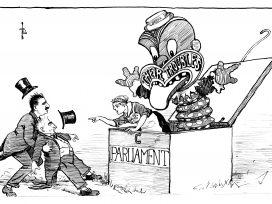Ask what your country is ready to do for theirs
After the Finnish parliamentary elections, the winner’s honeymoon went terribly wrong. In a strange election aftermath, an Iraqgate scandal brought down the first female prime minister of the country, Ms Anneli Jäätteenmäki in 63 days. Her mistake was to use confidential information about talks between her political opponent, former prime minister Lipponen and George W. Bush, in her election campaign. More than anything, this raises the question about the new role of the United States increasingly gaining mass as a political tool in the domestic politics of European countries, writes Jan-Erik Andelin.
Only four days after the Finnish parliamentary elections on 16 March, the first US Tomahawk missile flew into Baghdad, in a precision attack that the world media would describe as a ‘minor’ incident. The war on Iraq was on.
In Helsinki, the rurally-oriented Centre Party under its new leader, Anneli Jäätteenmäki, celebrated their return to political power. After eight years in opposition, the party grabbed 55 of the 200 seats in the Finnish parliament, while the ruling Social Democrats’ SDP, likewise successful, got 53 seats under the leadership of the long-time prime minister Paavo Lipponen.
The election campaign 2003 had been a fairly short and drowsy affair. After unprecedented broad government coalitions since 1995, spanning from Radical Left to Conservatives, the edge of most political issues had been grinded down, leaving many Finnish voters in a state of who cares. Also, the Finnish economy had been booming and blooming continuously for nearly a decade, led by numerous spin-offs from the IT giant Nokia. That contributed to the fact that no sharp debate on social issues in the country had taken place in the months before the elections. With an economic downturn around the corner, though, the Conservatives repeated the pattern of their sister party in Sweden, and lost big in the elections.
By the time the campaigns started early in 2003, there was a modest debate on whether non-allied Finland, like many “New European” countries in the Baltic Rim should join NATO. In the wake of the US-led war on Afghanistan, and with a new one on Iraq building up, public support for a NATO membership had dropped sharply down to some 11 to 14 percent in the polls. A general sentiment, however, was that the Finnish political elite was much more eager to “natoate” Finland, i.e. slowly work for an inevitable membership. This also caused tension among the Social Democrats, the strong party of nearly 30 years of Finnish politics. The foreign policy of the country was practically run only by players with a close link to SDP; the prime minister, the Foreign Minister, Finland’s EU Commissioner and three presidents of the Republic in a row had all been Social Democrats. This reign was – and is – however, far from unanimous. At the Social Democrats’ party congress in 2002, prime minister Paavo Lipponen was challenged for the party leadership by his own Foreign Minister, the more left-radical Erkki Tuomioja. Some small yapping still goes on between the two politicians on issues concerning Finland and the world.
Shooting herself into this massive Social Democrat bastion was not only brave, but also a political necessity for Anneli Jäätteenmäki. A similar card had been played by her party before. In the presidential elections in 2000, the party’s Esko Aho had challenged the ruling SDP troika on the EU boycott of Austria in 1999, which the Social Democrats supported firmly. The move was, however, not successful enough and Aho lost the battle narrowly. The long-time Foreign Minister Tarja Halonen rose to become the country’s first woman president, today eclipsing most of her predecessors in popularity.
In the US build-up for war on Iraq, Finland’s prime minister Paavo Lipponen had met with George W. Bush in the White House in December 2002. They had reportedly discussed Finnish participation in the reconstruction of Iraq and humanitarian aid after a war, that had not yet been fought. Also later, when there were only 21 days to go for the war on Iraq, the Bush administration invited diplomats from Finland and some 30 other countries to a “Coalition Briefing” in Washington. At the same time, Lipponen, a rising statesman-wannabe in the European halls, and one of the “founding fathers” of the EU Convention, had been advocating a peaceful solution in Iraq under the auspices of the UN.
With less than three weeks to go for the elections, Jäätteenmäki attacked Lipponen on Iraq. She questioned if it was possible that Finland supported both the American and the German stand on Iraq at the same time. She also pointed out that the prime minister and the Foreign Minister supplied contradictory information on Finland’s standpoint on the war. Then, for Jäätteenmäki, the sad chain of events started with a TV debate on the 6 March, where she accused Lipponen of giving unauthorized promises to the United States, tying Finland to a US-led coalition on Iraq. After the debate, Jäätteenmäki reportedly flashed some confidential documents to journalists to support her position. These documents also appeared in the press five days later, containing some servile praise, but nothing of great substance from the White House chat. After that more important issues were in the air. The world held its breath for the attack on Saddam Hussein and his now apparently non-existent WMD, and Anneli Jäätteenmäki went and won the elections.
International commentators and analysts were less enthusiastic over the Centre Party’s victory. It would bring back a fairly old-style government with the Social Democrats, a so-called red soil coalition, which has been the dominating one in Finnish politics since World War II.
Jäätteenmäki efficiently established a three-party base for a new government with the small liberal, Swedish-minority party SFP to support the Centre-SDP core. As soon as consensus on the government’s agenda was established, the acting prime minister and SDP leader Paavo Lipponen, suddenly withdrew from the negotiating table, and went skiing in Lapland with his family. He never returned to the government talks, and the new government was sworn in without him. Anneli Jäätteenmäki, a 48-year-old farmer’s daughter and a lawyer from Lapua in western Finland, became the first woman prime minister of the country.
The ceremony, where Anneli Jäätteenmäki introduced her new government to the grandma-like president Tarja Halonen became a merry one. The two leading woman politicians were seen strolling sisterly arm-in-arm down the halls of the presidential Palace in Helsinki, with a lot of relaxed giggle clinging under the cut-glass chandeliers when the formal part of the ceremonies were over.
Soon Anneli Jäätteenmäki departed for her first visits abroad. They included the 300 anniversary of St. Petersburg, where she also informally met with president George W. Bush during the festivities in the glory of the former Russian capital. Afterwards, in an almost absurd newspaper column, Jäätteenmäki’s husband, senior TV journalist, emphasized how much attention the American president, the most powerful man in the world, had shown his wife. But no image-building nor nice quotations from any Dubya small talk were of help at this stage. The roller-coaster was already in motion. In Helsinki, a police investigation was underway, trying to find out how confidential documents had reached the prime minister and the press before the March 2003 elections. It was soon established that Jäätteenmäki possessed confidential documents she shouldn’t have had, and on her return from Russia, she was questioned by police. Surprisingly, it was revealed that the confidential documents had been leaked by one of president Halonen’s aides.
Contrary to top state administrations in many other countries, the presidential Palace in Helsinki is a rather aged institution. Based in the old residence of 19 century ship magnate J.H. Heidenstrauch, it is staffed with aides and an odd set of military aide-de-camps that are inherited from one president to another. That also gave the system the escape. The presidential aide, a Mr. Martti Manninen, it was argued, had not acted out of the interests of the presidential Office, but out of loyalty to Jäätteenmäki’s Centre Party, which he was a long-time member of.
A heated debate in Parliament a few days later exposed that Jäätteenmäki must have been lying about the leaked confidential documents somewhere down the line. As her coalition partners, the Social Democrats, demanded her resignation, there was no way out. Jäätteenmäki boarded a biz-jet to the president’s summer residence Kultaranta, near Turku. In a brief outdoor ceremony in a Nordic light summer night, she handed over her formal resignation. Some photos were taken, with the leading sister politicians, who now suddenly appeared to have turned into something like a sketch, where a headmistress has to dismiss the brightest student of the whole school. They were worn and weary, and they had both cried.
Two days later, the same government was re-installed in its entity, with a new prime minister most Finns have barely heard anything about. Matti Vanhanen is an EU specialist and desk mole, with some of the most common names anybody could have in this northerly country, originally picked to be Minister of Defence.
Surprisingly little debate was devoted in Finland as to what prime minister Paavo Lipponen actually may have discussed with George W. Bush in late 2002, three-and-a-half month before there was a war. Why did the memoranda concerned have to be confidential in the first place ? That is a question asked by the ordinary men and women in their letters to the editors of the Finnish newspapers. The leading media and the political elite again have their focus elsewhere. They speak abundantly about where Anneli Jäätteenmäki possibly made a formal mistake among all the more and less confidential documents leaked daily in the Finnish capital. Yes, she lied, and she did it to achieve power. But she also dared to play with the relation to the Mightiest Nation on Earth. She dared to put the new global role of the United States of America in that focus in any future debate – global, regional or domestic – where most European politicians sooner or later sadly will accept that it belongs.
It has been pointed out that two prominent lawyers, who should have known better, were involved in the Finnish Iraqgate scandal. Anneli Jäätteenmäki was a former Minister ofJustice, and the presidential aide and source of the leak Mr Manninen, was known as a meticulously working lawyer. The third lawyer involved, was Madam president Tarja Halonen herself. To what extent she might have taken a calculated risk to assist in providing her sister in politics with the information she may have felt should become public, is a question nobody in Helsinki asks today. The police inquiry into the matter, including the role of the presidential Office, has been declared, yes, confidential.
In the confusion over what has happened,
one should ask whether it is patriotic or not to reveal information, not about what America can do for your country, but about what your government is ready to do for theirs.
Published 30 June 2003
Original in Swedish
Contributed by Ny Tid © Ny Tid Eurozine
PDF/PRINTNewsletter
Subscribe to know what’s worth thinking about.



